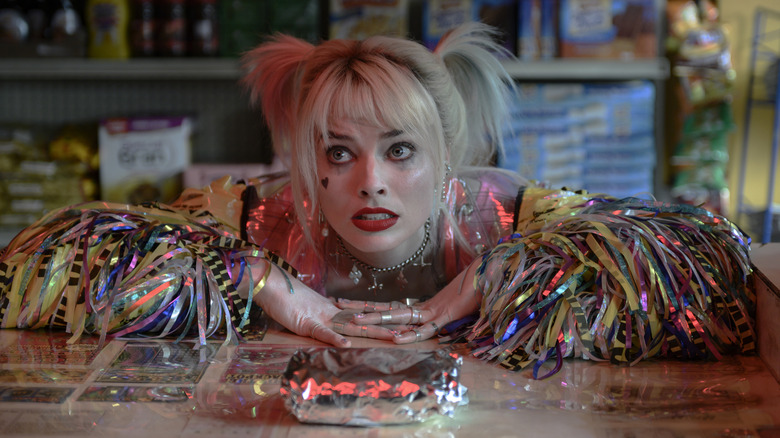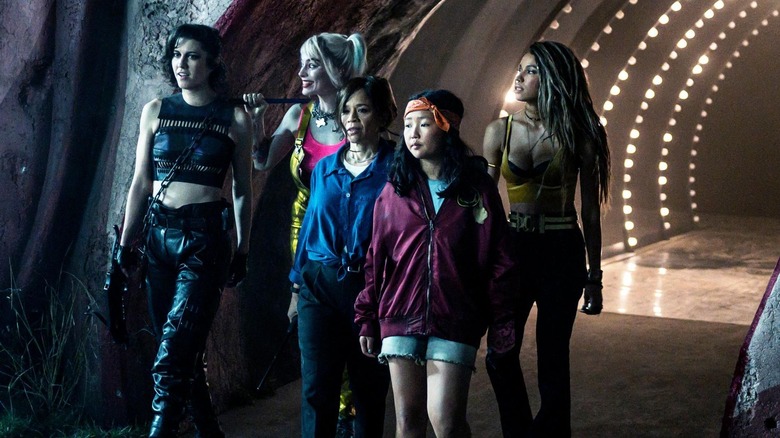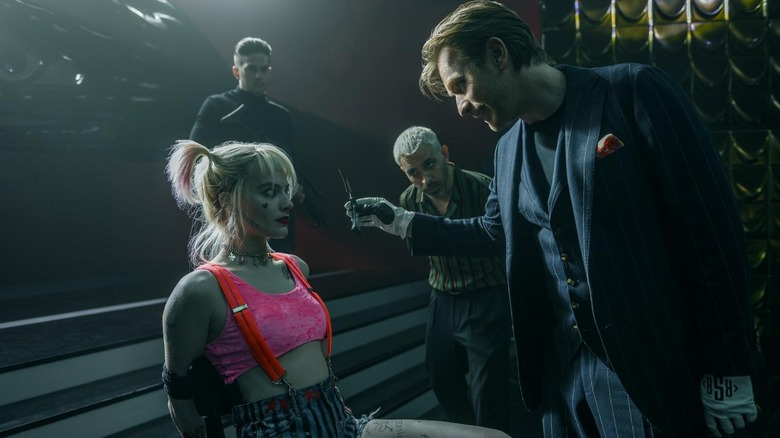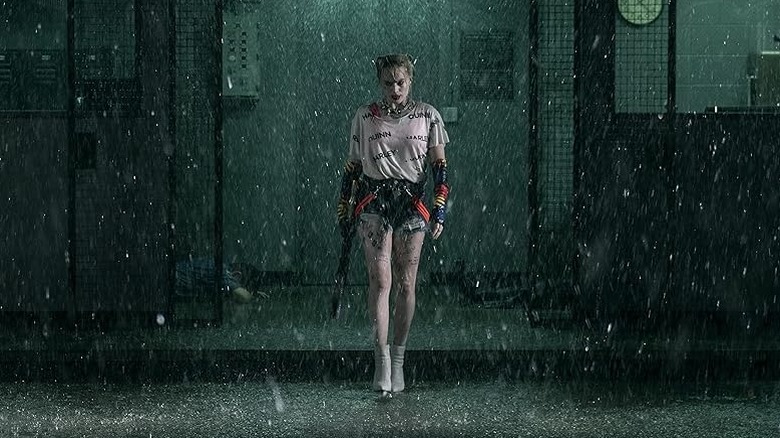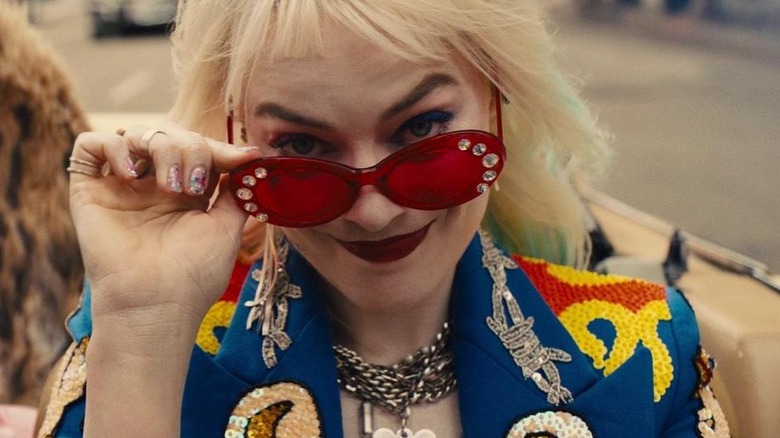5 Years Ago, One Of The DCEU's Best Movies Met A Grim Fate At The Box Office
(Welcome to Tales from the Box Office, our column that examines box office miracles, disasters, and everything in between, as well as what we can learn from them.)
"I pitched the idea of an R-rated girl gang film including Harley, because I was like, 'Harley needs friends.'" That's what Margot Robbie said in May 2018, explaining how Harley Quinn's eventual 2020 spin-off film "Birds of Prey" came to be. "I wasn't seeing enough girl gangs on screen, especially in the action space."
Warner Bros. was in a weird spot around this time. Marvel was running laps around DC in the cinematic universe space, with "Avengers: Infinity War" shattering records in 2018 and the MCU collectively generating billions upon billions of dollars globally. DC, meanwhile, was reeling from the commercial disaster that was "Justice League," while trying to build on the success of "Wonder Woman." As part of that plan, they leaned on Robbie's growing star power for an R-rated, colorful, woman-fronted romp in the DC Extended Universe. On paper, the studio did just about everything right, but paper isn't the real world. This was the right movie at the wrong time, setting DC's anti-heroines on a doomed cinematic voyage.
In this week's Tales from the Box Office, we're looking back at "Birds of Prey (and the Fantabulous Emancipation of One Harley Quinn)" in honor of its fifth anniversary. We'll go over how it came to be, this disjointed goings on behind the scenes with DC at the time, what happened when the movie hit theaters, what happened very shortly after the release, how that sealed its fate, and what lessons we can learn from it several years removed. Let's dig in, shall we?
The movie: Birds of Prey (and the Fantabulous Emancipation of One Harley Quinn)
The film as we know it sees a sinister villain named Roman Sionis operating in Gotham City and putting out a hit on a young girl named Cassandra Cain. The city's ever underbelly rises up looking for her. Meanwhile, Harley Quinn, having recently split from Joker, forms an unlikely alliance with Huntress, Black Canary, and a police officer named Renee Montoya in an effort to take Roman down and save Cassie.
Context is important here. In 2016, Warner Bros. scored a massive hit with "Suicide Squad," which pulled in an insane $747 million worldwide (in addition to winning an Oscar), despite earning largely unfavorable reviews. It didn't help that director David Ayer largely disowned the theatrical version, calling it "not my movie." Still, it was a big hit. Even before it hit theaters, WB was eyeing at least one spin-off, with Harley Quinn being the most obvious candidate, given the character's popularity.
Despite the DCEU getting off to a bumpy start with misfires like "Batman v. Superman" and "Justice League," positive momentum was building with "Wonder Woman," "Aqauman," and "Shazam!" all becoming big hits to go with critical acclaim. Still, the DCEU, as a universe, seemed fractured and a bit disjoined. For example, Ayer was working with Robbie on a different Harley Quinn spin-off titled "Gotham City Sirens" at the same time "Birds of Prey" was coming together. DC didn't have a mastermind like what Marvel Studios had with Kevin Feige. Cohesion seemed tough to come by.
Still, as Robbie's star power grew, this spin-off continued to gain steam. Cathy Yan ("Dead Pigs") was selected to direct the film, with Christina Hodson ("Bumblebee") handling the script. As things truly started to come together, the studio began adding more star power alongside Robbie. Ewan McGregor was cast as Roman, aka Black Mask, with Mary Elizabeth Winstead as Huntress, Jurnee Smollett as Black Canary, Rosie Perez as Renee Monotoya, and a relatively unknown Ella Jay Basco as Cassandra Cain.
Trying to divorce Birds of Prey from Suicide Squad was a challenge
The issue Yan faced was trying to craft a Harley Quinn movie that both acknowledged "Suicide Squad" yet distanced itself from it. During a visit to the "Birds of Prey" set, Yan explained, politely, that this was no easy task.
"It's definitely a challenge because you wanna pay homage to not just the comic books, but then also the films before it, and obviously we've seen Margot play Harley before in 'Suicide Squad.' And so it's definitely a fun challenge to figure out, like, what do we keep from that version of Harley and what we differentiate."
Yan did try to differentiate "Birds of Prey" visually, as it was a far more colorful, gleeful film than "Suicide Squad," in addition to being R-rated. It also upped the action, joining with "John Wick" director Chad Stahelski's company 87Eleven to do so. "We've been working with 87Eleven from the beginning. And the reason that I chose them was because I wanted that style," Yan said during a press junket in 2020.
Warner Bros. kept the budget low on this one, relatively speaking, just as they did with "Shazam!" in an attempt to set it up to succeed. Reshoots, which saw Stahelski join as the second-unit director to up the action, certainly increased the budget, but "Birds of Prey" still cost between $82 and $100 million, which is very low for a comic book movie. That was of great benefit.
The problem was semi confused marketing at a time when DC didn't have automatic goodwill like Marvel did. Despite the popularity of Harley Quinn as a character, her name didn't appear until the "Fantabulous Emancipation of One Harley Quinn" subtitle was added. Most people just referred to it as "Birds of Prey" anyhow.
The financial journey
For what it's worth, Yan did her job as "Birds of Prey" was met with a generally warm response from critics ahead of its release. Writing for /Film at the time, Hoai-Tran Bui called it "stylish, hilarious, and satisfying" in her review. Bui wasn't alone in her praise for Harley Quinn's R-rated girl gang movie. Warner Bros. also put their weight behind the film, with a full, big marketing campaign. It's just that the campaign was a bit confused, partially because of the title, and partially because it was trying to capitalize on a prior hit while also trying to demonstrate that it wasn't just a rehash of a movie a lot of people didn't like.
"Birds of Prey" hit theaters on February 7, 2020. The good news is that it topped the box office on its opening weekend, in no small part because it was the only big new release in theaters. The bad news is that it opened to just $33 million, which was on the very, very low end for a comic book movie. Save for any of the movies in 2021 and beyond, no DCEU movie dating back to Zack Snyder's "Man of Steel" which started this universe in 2013 had a lower opening weekend.
To make matters worse, the following weekend saw "Sonic the Hedgehog" arrived to a larger than expected $58 million, en route to starting a $1 billion franchise. "Birds of Prey," to its credit, only dropped 48% for a $17.1 million second weekend haul, but when your opening is so low, it's tough to overcome. Without a bigger hold and with huge competition, the movie's fate was sealed.
"Birds of Prey" finished its run with $84.1 million domestically to go with $121.2 million internationally for a grand total of $205.3 million worldwide. It was a disappointing total, but there was also more to this unfortunate equation than confused marketing and some potential mistrust of the DC brand.
The pandemic was the final nail in the coffin for Birds of Prey
By February 2020, the Covid-19 pandemic had already been making headlines around the world. Even though the U.S. wouldn't shut down until March, with "No Time to Die" becoming the first major release to be delayed as the virus loomed. China had already begun quarantine, and that meant one of the biggest moviegoing markets in the world was essentially off the table.
As the pandemic made its way across the world, theaters all across the U.S. shut down in early March, which meant that "Birds of Prey," and every other movie in theaters, had its run cut short. Not that this movie had been doing particularly well, but it certainly would have at least had a few more weeks to earn some extra cash. That, coupled with the money it would have made overseas, and it's not hard to imagine a scenario in which "Birds of Prey" was at least a modest theatrical hit.
Even before theaters shut down though, there was some fallout. By February 10, theater chains started advertising Yan's DCEU entry as "Harley Quinn: Birds of Prey." Reports at the time suggested that was at the request of Warner Bros. Whether or not that's true, the message was the same; something wasn't working. Good movie or not, it just seemed like everything was working against it.
It didn't matter that up to that point that only "Shazam!" and "Wonder Woman" had earned better reviews. The circumstances completely upended any chance this movie had of making what it needed to make during its theatrical run.
The lessons contained within
The pandemic further screwed up the releases of "Wonder Woman 1984" and "The Suicide Squad," with "The Flash," "Shazam! Fury of the Gods," and "Blue Beetle" also struggling in 2023. After "Aquaman and the Lost Kingdom" in December of that year, the DCEU was done, with James Gunn and Peter Safran now launching a reboot of the DC Universe beginning with Gunn's "Superman" movie this summer.
In some ways, "Birds of Prey" was the beginning of the end for the DCEU. Despite the goodwill built up by movies like "Wonder Woman," "Aquaman," and the surprise $1 billion success of "Joker," the DC brand had become too fractured, with too many moving pieces on the board. Yan did the right things. Warner Bros. gave this movie a reasonable budget and put their weight behind it with the marketing campaign. Did they perhaps botch the marketing? Almost certainly, but the studio can't be blamed for the pandemic, which is one of the bigger factors at play here. In the end, circumstance doomed a good movie, and that's a real shame. Who knows what might have happened if "Birds of Prey" had been given a truly fair shake. At the same time, it's not as though the DCEU was likely to survive.
"Captain Marvel" proved female-fronted superhero movies could succeed at the highest levels. "Deadpool," and "Joker" proved R-rated comic book movies could succeed at the highest levels. Nobody can rightfully point to those factors when it came to this film's underperformance. Sometimes, the right things can still lead to the wrong outcome. The hope, in the future, is that Hollywood continues to take creative risks in the realm of comic book cinema, rather than trying to play it too safe.
